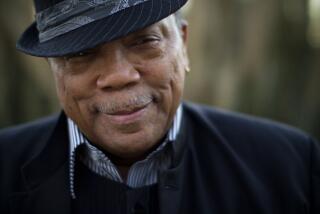Jackson’s death ruled a homicide
- Share via
The Los Angeles County coroner’s office said Friday that it had officially ruled Michael Jackson’s death a homicide and determined that a surgical anesthetic combined with other medication killed him.
In a one-page statement, officials listed the cause of Jackson’s June 25 death as “acute propofol intoxication” with the additional factor of “benzodiazepine effect.”
Three different sedatives that fall into the benzodiazepine drug class were in Jackson’s system, but only the anti-anxiety medication lorazepam, often known by the brand name Ativan, was cited alongside propofol as “the primary drugs responsible for Mr. Jackson’s death.”
Jackson’s personal physician, Dr. Conrad Murray, has acknowledged administering both medications to Jackson in the hours leading up to his death, according to search warrant affidavits.
The cardiologist told detectives that in an effort to get the insomniac singer to sleep on the morning of his death he administered the sedatives lorazepam, midazolam and diazepam, and that when they proved ineffective, he complied with Jackson’s request for propofol, a powerful anesthetic intended for use in operating rooms, the affidavits state.
Toxicology tests also detected two other medications, the local anesthetic lidocaine and ephedrine, commonly used as a stimulant, according to the coroner’s statement.
The complete toxicology results and the final coroner’s report were not made public at the request of the LAPD and the Los Angeles County district attorney’s office, the coroner’s office said.
The coroner’s classification of homicide -- the killing of one person by another -- does not always translate into criminal charges, and those close to the investigation have said Jackson’s history of drug use and health problems could complicate any prosecution.
But the designation was additional confirmation that Murray, already identified in search warrant documents as the target of a manslaughter investigation, remained the focus of the ongoing, multi-agency inquiry into the entertainer’s sudden death.
A law enforcement source told The Times on Friday that toxicology reports have led investigators to suspect that Murray gave Jackson more propofol than he told police. Murray’s attorney answered that allegation by calling on authorities to release the entire report so independent experts could examine the results.
“Come clean with it and let’s get on with the process,” said lawyer Edward Chernoff.
He said a forensic pathologist working in Murray’s defense has been hamstrung by the limited information in the coroner’s statement, which the lawyer dismissed as “nothing new.”
While cautioning that the absence of public lab results made it impossible to analyze the coroner’s conclusions, toxicology experts said that the coroner’s identification of benzodiazepine as a contributing factor suggested the sedative lorazepam might have intensified the effect of the propofol.
Forensic toxicologist Robert Middleberg, laboratory director at Pennsylvania’s private NMS Labs, said both drugs depress the central nervous system and can have an additive effect when used together.
“When you combine them, it’s not just one plus one equals two anymore. It’s one plus one equals three, four, five, six, seven or some other number,” he said.
Brain activity can slow to the point that breathing stops altogether, he said.
In a statement from their publicist, Jackson’s family commended investigators for their work and said his relatives were looking “forward to the day that justice can be served.”
Also on Friday, California Atty. Gen. Jerry Brown announced that at the request of the LAPD, his office would launch an independent investigation into several doctors who may have treated Jackson in recent months.
--
Times staff writer Kimi Yoshino contributed to this report.
More to Read
Sign up for Essential California
The most important California stories and recommendations in your inbox every morning.
You may occasionally receive promotional content from the Los Angeles Times.












